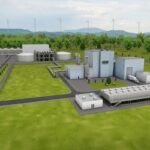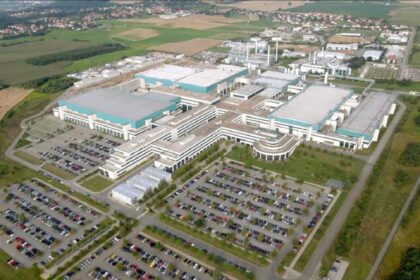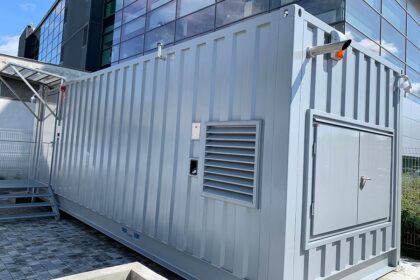Earthquake Strikes Southern Taiwan Early Morning
On January 21, a powerful 6.4 magnitude earthquake struck southern Taiwan, affecting several regions, including the key tech hubs where Taiwan Semiconductor Manufacturing Co. (TSMC) operates. The earthquake, which hit just after midnight local time, caused significant disruption, particularly in Chiayi County’s Dapu District, where severe damage was reported. According to Taiwan’s fire department, 26 people sought medical treatment due to injuries sustained in the quake, highlighting the severity of the tremors in the affected area. Despite this, TSMC confirmed that all of its personnel at fabs across Taiwan were safe.
TSMC’s Response to the Earthquake
TSMC acted swiftly to safeguard its employees and ensure the continuity of operations. In response to the tremors, TSMC implemented its safety protocols across its fabs in Taiwan’s Southern, Central, and Hsinchu Science Parks. The company reported that the maximum seismic intensity reached level 5 at its Southern Science Park fabs, level 4 at Central Science Park, and level 3 at the Hsinchu Science Park sites. Following these measures, all personnel were accounted for by 1 a.m., confirming their safety.
The company’s facilities underwent thorough structural inspections to ensure their integrity. Post-quake checks confirmed that all buildings were structurally sound, and operations gradually resumed throughout the day. TSMC’s construction projects were unaffected, and the company noted that its water supply, power, and workplace safety systems remained operational.
Impact on TSMC’s Taiwan Fabs and Global Operations
TSMC’s Taiwan facilities are integral to global semiconductor production, with the company being the world’s largest contract manufacturer of chips. The company produces essential components for major technology firms, including Nvidia, AMD, Apple, Qualcomm, and Broadcom. While the earthquake did cause temporary disruptions, TSMC’s robust emergency response system ensured minimal impact on its production capabilities.
This earthquake follows a series of natural disasters that have tested TSMC’s resilience. In April 2024, a 7.2 magnitude earthquake also triggered evacuations and halted construction activities at some of TSMC’s sites. Furthermore, the company had to implement typhoon alert preparations in October 2024 due to Typhoon Krathon. These events underscore the importance of TSMC’s crisis management and disaster recovery plans, which continue to be refined to ensure operational stability.
TSMC’s Earthquake Preparedness and Safety Protocols
TSMC has long been committed to disaster preparedness, particularly considering Taiwan’s vulnerability to natural disasters. The company’s facilities are designed with seismic resilience in mind, and the timely evacuation of staff and structural safety inspections are integral parts of its emergency response plan. TSMC’s swift recovery from this earthquake is a testament to the company’s preparedness and its ability to minimize downtime, crucial for maintaining the delicate supply chains in the semiconductor industry.
TSMC’s Role in Global Semiconductor Manufacturing
As a leader in semiconductor manufacturing, TSMC’s operations in Taiwan are critical not only to local industries but also to global technology markets. The company’s fabs on Taiwan’s West Coast are at the forefront of producing advanced chips that power everything from smartphones to cloud computing infrastructure. Given its scale, TSMC’s operations are closely watched by the technology and finance sectors alike.
Frequently Asked Questions (FAQ)
1. How does TSMC ensure the safety of its employees during natural disasters?
TSMC has a comprehensive emergency response plan that includes evacuations, structural inspections, and safety system checks. These measures are put in place immediately after any natural disaster to protect personnel and ensure that production can resume quickly.
2. What areas of Taiwan are most affected by earthquakes that impact TSMC?
TSMC’s fabs are located in Southern, Central, and Hsinchu Science Parks, all of which are on Taiwan’s West Coast. These areas are particularly susceptible to earthquakes due to Taiwan’s geological activity.
3. Has TSMC faced significant production delays due to past earthquakes?
While earthquakes, such as the 7.2 magnitude quake in April 2024, have caused temporary delays and evacuations, TSMC’s proactive disaster recovery systems ensure minimal long-term disruption to production.
4. How does TSMC’s earthquake preparedness compare to other semiconductor manufacturers?
TSMC is considered one of the leaders in disaster preparedness among semiconductor manufacturers. Its facilities are designed to withstand earthquakes, and its response protocols are regularly tested and updated.
5. What impact do natural disasters have on TSMC’s role in global supply chains?
Natural disasters, while disruptive, have not significantly affected TSMC’s global supply chains due to its robust crisis management systems. However, they do highlight the vulnerability of global tech industries to regional natural events.


















